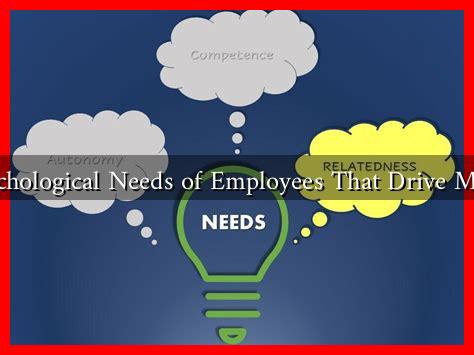-
Table of Contents
What Are the Psychological Needs of Employees That Drive Motivation in 2025
As we move further into the 21st century, the landscape of work continues to evolve, influenced by technological advancements, shifting societal norms, and changing employee expectations. By 2025, understanding the psychological needs of employees will be crucial for organizations aiming to foster motivation and enhance productivity. This article explores the key psychological needs that drive employee motivation and offers insights into how organizations can address these needs effectively.
The Importance of Psychological Needs in the Workplace
Psychological needs are fundamental to human behavior and motivation. According to Maslow’s Hierarchy of Needs, individuals are motivated by a series of hierarchical needs, ranging from basic physiological needs to self-actualization. In the workplace, addressing these psychological needs can lead to higher job satisfaction, increased engagement, and improved performance.
Key Psychological Needs Driving Motivation in 2025
In 2025, several psychological needs will be particularly influential in driving employee motivation:
- Autonomy: Employees increasingly seek autonomy in their roles. The ability to make decisions and have control over their work fosters a sense of ownership and responsibility.
- Mastery: The desire to improve skills and achieve mastery in one’s field is a powerful motivator. Organizations that provide opportunities for professional development and continuous learning will see higher levels of engagement.
- Purpose: Employees want to feel that their work contributes to a greater purpose. Organizations that align their missions with social and environmental causes can inspire employees and enhance motivation.
- Belonging: A sense of belonging and connection with colleagues is essential. Fostering a supportive and inclusive workplace culture can significantly impact employee morale and motivation.
- Recognition: Regular recognition and appreciation for contributions can boost motivation. Employees want to feel valued for their efforts and achievements.
Case Studies and Examples
Several organizations have successfully addressed these psychological needs, leading to increased motivation and productivity:
- Google: Known for its innovative work culture, Google emphasizes autonomy and mastery. Employees are encouraged to spend 20% of their time on personal projects, leading to the development of successful products like Gmail and Google News.
- Salesforce: This company prioritizes purpose and belonging by integrating social responsibility into its business model. Salesforce’s commitment to philanthropy and community engagement resonates with employees, enhancing their motivation.
- Netflix: Netflix’s culture of freedom and responsibility allows employees to take ownership of their work. The company emphasizes recognition through regular feedback and open communication, fostering a motivated workforce.
Statistics Supporting Psychological Needs
Research supports the importance of addressing psychological needs in the workplace:
- A Gallup study found that organizations with high employee engagement have 21% higher profitability.
- According to a report by Deloitte, 94% of executives and 88% of employees believe a distinct workplace culture is important to business success.
- The World Economic Forum reported that companies focusing on employee well-being see a 10% increase in productivity.
Strategies for Organizations
To effectively meet the psychological needs of employees, organizations can implement the following strategies:
- Encourage Autonomy: Allow employees to set their own goals and make decisions related to their work.
- Invest in Learning: Provide training programs, workshops, and mentorship opportunities to help employees develop their skills.
- Communicate Purpose: Clearly articulate the organization’s mission and how each employee’s role contributes to it.
- Foster Inclusion: Create a culture of belonging by promoting diversity and inclusion initiatives.
- Recognize Achievements: Implement regular recognition programs to celebrate employee contributions.
Conclusion
As we approach 2025, understanding and addressing the psychological needs of employees will be paramount for organizations seeking to enhance motivation and productivity. By focusing on autonomy, mastery, purpose, belonging, and recognition, companies can create a work environment that not only meets the needs of their employees but also drives organizational success. The future of work will be shaped by those who prioritize the psychological well-being of their workforce, leading to a more engaged, motivated, and productive team.
For further insights on employee motivation and workplace culture, consider exploring resources from the Gallup Organization and Deloitte.

